- Home
- Franklin W. Dixon
The Secret of the Lost Tunnel Page 4
The Secret of the Lost Tunnel Read online
Page 4
“Help yourself,” the old man said with a flourish of his hand as he sat down again. “This house is full of things they dug up from the battlefield.”
The boys stood for a moment taking in their surroundings. Pictures of famous battle scenes and historic plantations covered three walls, while a huge fireplace with its carved mantel occupied most of the remaining wall.
Frank walked to one of the exhibits. “Look at these pistols,” he said, bending over a table to examine a collection of many shapes and sizes.
“Here’s something that’ll interest you,” Joe said to Chet. “Some Civil War photographs.”
The boys turned their attention to the wall, where half a dozen rare old pictures showed a local encampment just before the Battle of Rocky Run.
“Don’t forget we’re looking for a clue to the old bandoleer,” Frank remarked.
“You’ll not find a clue here!”
The words boomed from behind the boys. They whirled around to face the speaker, who had appeared as if out of nowhere.
He was a tall, thin man whose long, sharp nose was accentuated by a broad black mustache and flowing black hair. Dressed in the costume of a plantation owner of the Civil War period, the man looked as if he had stepped out of one of the museum pictures.
“I’m Professor Randolph,” he stated with a deep voice, “and why are you boys trespassing on my property?”
“We understood this was a museum, Professor, open to the public,” Frank explained.
The man raised his eyebrows and with a half-smile said, “It was a museum until I bought it. You see, I’m a doctor of philosophy. I’m writing a book on the history of the Civil War so I bought the museum—to catch the spirit of the thing, you understand.”
“We don’t understand!” Joe countered. “That old fellow over there ...” The boy turned. The chair by the doorway was empty.
“What fellow?” Professor Randolph asked.
Chet’s eyes popped. He edged toward the door as the Hardys protested leaving so soon.
“You haven’t any right on private property!” roared the man suddenly. “Get out!”
CHAPTER VI
A Peculiar Professor
FRANK and Joe exchanged glances. Perhaps Professor Randolph really had bought the museum!
“I think we’d better play safe and leave,” Frank whispered to his brother. “If he’s the owner, we’re breaking the law by trespassing.”
“So gratifying to see you agree with me.” The man smirked as the boys walked out. “You realize the cause of education must be served!” He bowed stiffly.
“What a character!” Frank remarked as the three boys stepped into their car. “He reminds me of a comic-strip villain.”
Chet bobbed his head to mimic a bow. “To be sure, my dear boys. It’s all for education. What do you suppose he teaches?”
Joe grinned. “Young boys, and knows how to put them in their places.”
“Perhaps General Smith is acquainted with Professor Randolph,” Frank suggested as they drove through Centerville. “If they’re friends, then Randolph will let us in after all.”
Soon they reached the house. When the boys entered, they realized the general was battling with a problem of his own. He seemed decidedly agitated and was pacing up and down the living room, his red hair rumpled.
Frank was alarmed. What dire turn of events had occurred? “General Smith, what’s the matter?” he asked.
Aroused from his thoughts, the man turned with a start. “Matter? Everything! The house has been ransacked!”
“Good night!” Joe exclaimed. “Since we ate lunch?”
“It must have happened before then,” the officer replied. “Nothing downstairs was touched. Just the second-floor bedrooms!”
“None of us went up there at noontime,” Frank recalled. “Was anything taken?”
“Nothing of mine so far as I can make out,” the officer replied. “The things in our suitcases and dresser drawers were strewn about. You’d better check on your own belongings!”
Frank and Joe ran up the stairs three at a time, and Chet was not far behind. They found their room a picture of disarray. Clothes which had hung in the closet lay on the floor and the contents of their bags were scattered over the rug.
“Gosh,” Chet moaned as he began to pick up his things, “I hope they didn’t take it.”
“Take what?” Joe was curious.
“I had a box of special attachments for my camera in this... Oh, here it is!”
The Hardys went on checking their belongings minutely while General Smith watched.
“All my stuff is here,” Joe said finally.
“Mine too,” Frank added, rising from his kneeling position. Then he let out a sudden exclamation. “Wait! The picture is gone!”
“Picture?” the officer repeated.
“The half-man that Chet snapped in Bayport.”
“That proves it!” Joe shouted. “Bush or a cohort has been here! Nobody else would want that photo.”
“Right,” Frank agreed. “But I don’t think that’s what he was after. He probably didn’t even realize that Chet had taken the snapshot.”
“It doesn’t matter,” Chet piped up. “I have the negative, and I even brought another print in my wallet.”
“That’s good,” Frank continued. “But I’ll bet Bush was after a map showing where the lost gold was buried.”
“But we haven’t any map,” Chet replied, perplexed.
“Bush probably thinks we have,” Joe said. “Which indicates he still doesn’t know where to look for the treasure.”
By the time the boys had straightened up the place, General Smith had regained his composure.
“We must get someone to guard this house when we’re away,” he said. “I know just the man for the job, if he’s still in town. I’ll send a note to Claude.”
General Smith explained to his visitors that Claude was his Army orderly and was on vacation at his home in Centerville, too. The officer requested the boys to deliver the note, as he did not want to leave the house unoccupied. He suggested they continue their sleuthing alone.
Before going, Frank asked General Smith if he knew Professor Randolph, and told him about the incident at the museum.
“No, never heard of him,” the general replied. “But it doesn’t surprise me that the museum’s been sold. It always ran at a loss.”
Upon reaching Centerville, Frank parked in the town square. Joe offered to deliver the general’s note and started down the narrow, cobble-stoned street where the orderly lived. As the others waited for him, Frank gazed across the square. His eyes lighted on the courthouse and an idea occurred to him. If Professor Randolph had bought the museum, the deed would be registered there.
“Wait here a minute,” he said to Chet. “I’ll be right back.”
The courthouse was a low brick building that looked like a church without a steeple. Two heavy white columns stood on either side of the front doorway. Frank entered and asked an attendant where deeds were registered. He was directed to an office down the hall. In it was an old man, beside whose desk towered row upon row of thick volumes of records.
“Something I can do for you?” he asked.
“Yes,” Frank replied. “I’ve been told the old Rocky Run Museum has been sold to a Professor Randolph.”
“Hm!” said the man, peering over his spectacles. “That’s news to me. Nothing of the sort has been registered here.”
“Maybe the deed was recorded while you were out,” Frank suggested.
The man hooked his thumbs into his suspenders and tilted back in his chair.
“Son,” he said, “I’ve been settin’ here for forty years, ’cept for lunch, and when I’m out this office is closed.”
Frank smiled, thanked the man, and walked back to the car. “I had a hunch Professor Randolph’s story was a fake,” he told Chet and his brother, who had returned from the orderly’s house.
“Well,” Chet said, “if Ran
dolph is still there, I think that old museum is a good place to stay away from.”
“I should say not!” Frank’s jaw jutted with determination. “We’re going right back and tell Randolph the place isn’t his.”
“Agreed,” said Joe. “And we’re going to find out if Randolph has anything to do with our case.”
“Say, fellows,” Frank whispered, “I think somebody’s been watching us.” He glanced in the direction of the hotel.
“Who?” Chet asked.
“I didn’t see enough to identify him, but I saw a man slip into the alley alongside the building.”
Joe looked across the square. Nobody was in sight.
“I don’t like this,” Frank said uneasily. “I think maybe we had better try a back route to the museum.”
“A good idea,” Joe agreed. “If anybody’s following us, we may throw him off the track this time. Let’s go!”
A sandy road led the boys off the main highway and through a stretch of woodland. The trees interlaced high overhead, making a canopy which filtered out the afternoon sun.
“We’re not going to get there in a hurry,” Joe said. “This road’s too bumpy.”
Frank deftly steered the car along the rutty road, avoiding large rocks which now and then jutted from the side. They drove down a little gully, then up a steep slope.
“Hey, wait!” Chet shouted suddenly.
“What’s up?” Joe asked.
“Look at those deer! I want to get a picture!”
A hundred yards to the left near a brook in the woods stood three deer.
“Okay,” Frank said, bringing the car to a halt. “But make it snappy.”
Chet climbed out. He flipped open his camera case, then tiptoed into the woods. The deer, being downwind, did not scent the boys. They went on feeding.
“Take them from there,” Joe called softly.
“Can’t—I have to get closer.”
Chet walked a dozen paces, peered into his view finder, and advanced a few more feet.
In the stillness Frank thought he heard the sound of a motor behind them. He looked back. No car was in sight, and the hum stopped.
“Guess I’m jittery,” he told himself.
“Hurry up!” Joe motioned to Chet.
But Chet, thinking he could get an even closer shot, continued to advance, tiptoeing as he went. He dropped down on one knee, holding the camera close to his eye. The deer were in perfect range.
But before Chet could click the shutter, a startled shout broke the stillness of the woodland. In a flash the deer leaped away.
Chet whirled about to see who had spoiled his picture. No one was in sight. In sudden panic he raced back to the road.
“Frank! Joe!” he shouted. “Hey, fellows, where are you?”
No answer came. The car was deserted!
CHAPTER VII
The Search
CHET peered into the car, then stooped to his knees to look underneath it. The Hardys had apparently vanished into thin air!
“Hey, Frank! Joe!” Chet shouted in alarm. Beads of perspiration began to trickle down his freckled face. Again he shouted for his companions. The air was still.
After half an hour of futile waiting and calling for the brothers, Chet was thoroughly alarmed.
He got into the car, turned it around, and started back to Centerville as fast as the rugged road would permit. Finally it joined the main highway and Chet sped through Centerville to the general’s house.
“Frank and Joe—they’re gone!” he cried out, running into the house.
As Chet related his story, a look of growing concern appeared on the general’s face.
“They wouldn’t go off without telling me,” Chet said breathlessly. “Something’s happened to them!”
The general had no doubt of this. “There’s not a minute to lose. If we can’t locate them ourselves, I’ll notify the police.”
They got into the car. With General Smith behind the wheel, they pulled away from the house and onto the main highway.
Soon they came to the intersection where the boys had left the highway. The officer took the bumpy road which led into the woods.
“Where does this go?” Chet asked.
“It stays straight for a mile, then makes a complete loop and comes out near the old Beauregard Smith plantation.”
“Jumpin’ catfish!” Chet exclaimed. “Then we were going in the wrong direction for the museum anyway!”
It was not long before the convertible dipped into the gully and rose over the brow of the hill where Frank had stopped for Chet’s attempted photo of the deer.
“Here’s the place!” Chet said.
Braking to a halt and shutting off the motor, General Smith stepped out. Chet followed.
“There must have been a struggle here,” the officer said, examining scuff marks in front of a dense thicket.
“The trail leads this way.” Chet pointed to dragging heel marks. “Frank and Joe must have been kidnapped!”
With Chet following, the general pushed into the underbrush and advanced into the dank woodland. Ferns and tiny white wild flowers which carpeted the forest had been trampled. The route was clear, and the officer was making swift progress.
The man pressed on relentlessly, unmindful of the briers that tore his trousers, and seemingly unaware that Chet was puffing along behind him like a heavy tank.
But dusk was falling rapidly, and soon the gloom was so dense that further progress was impossible without a light.
“What a dud I am!” the general exclaimed. “Coming off like this without a flashlight!”
Chet, more eager than ever to find his friends, volunteered to return to the convertible for a flashlight. A short time later, perspiring heavily, he was back with the light.
“Here you are, sir.”
“Good work.”
They set off again, this time at a snail’s pace, in order not to miss any telltale heel marks made by one of the kidnapped boys. An hour passed as they continued combing through brush.
“I haven’t seen any tracks for a hundred yards,” said the general, stopping to take stock of the situation.
“Do you suppose the kidnappers went down the stream?” Chet asked.
“Very possibly. They may have waded a distance to throw us off their trail.”
The searchers combed the pasture grass to the edge of the stream, but not a clue came to light. Discouraged, and completely tired out after the long search, both lay down to rest. To add to their discomfort, it began to rain. The rain came down so hard that they crossed the stream and took shelter under some overhanging rocks.
The rain continued all night as Chet and the general slept fitfully on improvised beds of leaves. A faint streak of light had brushed the eastern horizon before the torrent stopped. Now the hunt could be resumed in daylight.
The man and boy rose wearily and stretched their cramped limbs.
“I sure could use some breakfast!” Chet muttered sadly.
“Or a dry, comfortable bed!” the general added ruefully. “But we’d better get moving if we’re going to find Frank and Joe.”
“I hope the kidnappers haven’t taken them far. I’ll look on this side of Rocky Run for footprints,” Chet offered.
“Very good,” General Smith agreed. “The boys may have crossed somewhere.”
Chet zigzagged along the bank.
“See anything?” called the officer, who was searching in the opposite direction.
Chet shook his head in the negative, then suddenly let out a whoop. He held up a shoe!
General Smith hurried to the boy’s side.
Impressed into the lining were the words Peck Co. Bayport.
“Nice work! Come on!”
Once more they probed the grass.
“Here’s the trail again,” said the general, following patches of recently broken vegetation over the hill.
“Golly, what a climb!” Chet puffed.
Grasping scrubby trees on the hills
ide, the man and boy worked their way to the top of the incline. The bare rocks there revealed no clue of recent travelers, nor had the mossy slope down the other side been disturbed lately by any human foot.
Slipping over the steep rocks, Chet and the general descended the hill again to the spot where the shoe had been found.
They moved ahead slowly, examining every bent tuft of grass. Suddenly Chet stopped.
“Come here, General Smith!” he called excitedly.
“What’s up?”
Chet did not answer. He stood spellbound.
“Listen!”
The officer obeyed. At first he could hear only the ripple of the brook and the clear whistle of an oriole.
“Nothing unusual.”
“Shh! It may come again.”
The general strained to catch the faintest sound.
Then it came to him. A muffled shout from somewhere down inside the earth!
CHAPTER VIII
An Important Lead
“SOMEBODY’S under these rocks,” Chet shouted. He rushed forward, his hands pulling at the vines which blanketed several boulders. “General Smith, look what’s here!”
By the time the officer arrived at the boy’s side, Chet had uncovered an old wooden door fitted into the face of a big rock. Its rusted hinges were fastened to the boulder with long iron spikes. A rotting leather thong served as a doorknob.
“Frank! Joe!” The general leaned close to the door and shouted. There was a muffled answer.
“We’ll get you out!” Chet called.
He took hold of the leather thong, which broke at his pull. “We’ll have to pry the door open,” he said.
“Let me get hold of it,” General Smith offered.
The husky man picked up a sharp stone and banged out an old knot in the wood, making room for two of his fingers. With a mighty grunt he pulled on the door. It creaked, then suddenly yawned open.
A whiff of stagnant air, redolent of rotting wood and sour earth, burst forth. Chet and the general peered inside the dark hole.
The sound of stifled voices came from the rear of the cave. The general pulled out the flashlight and clicked it on. The glow fell on two figures, lying on the dank ground. They were tied and gagged.

 The Great Pumpkin Smash
The Great Pumpkin Smash Who Let the Frogs Out?
Who Let the Frogs Out?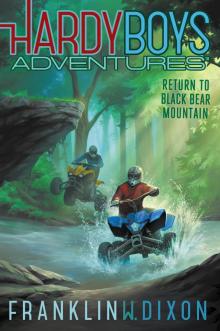 Return to Black Bear Mountain
Return to Black Bear Mountain A Treacherous Tide
A Treacherous Tide Bug-Napped
Bug-Napped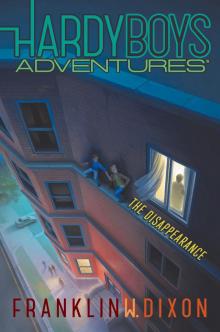 The Disappearance
The Disappearance Sea Life Secrets
Sea Life Secrets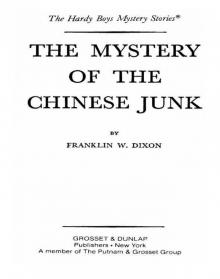 The Mystery of the Chinese Junk
The Mystery of the Chinese Junk A Skateboard Cat-astrophe
A Skateboard Cat-astrophe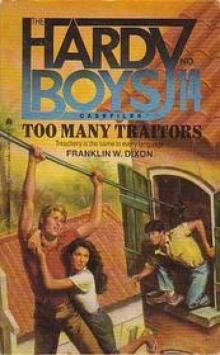 Too Many Traitors
Too Many Traitors Galaxy X
Galaxy X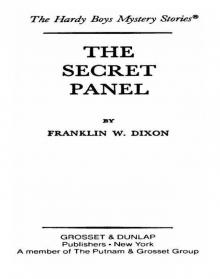 The Secret Panel
The Secret Panel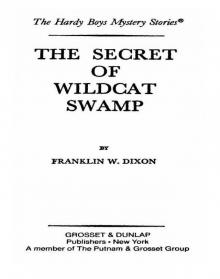 The Secret of Wildcat Swamp
The Secret of Wildcat Swamp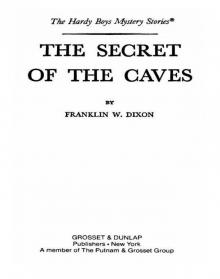 The Secret of the Caves
The Secret of the Caves The Caribbean Cruise Caper
The Caribbean Cruise Caper Without a Trace
Without a Trace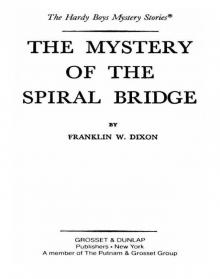 The Mystery of the Spiral Bridge
The Mystery of the Spiral Bridge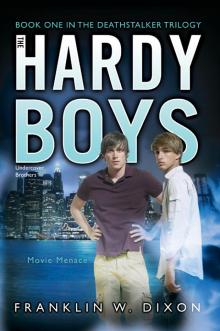 Movie Menace
Movie Menace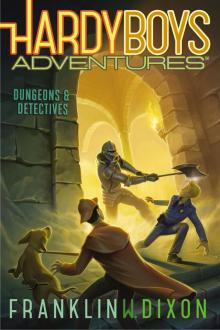 Dungeons & Detectives
Dungeons & Detectives Water-Ski Wipeout
Water-Ski Wipeout The Case of the Psychic's Vision
The Case of the Psychic's Vision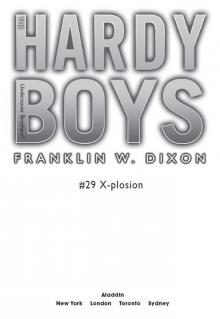 X-plosion
X-plosion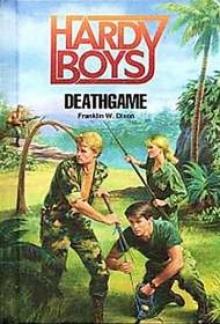 Deathgame
Deathgame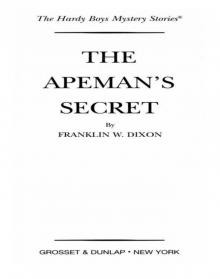 The Apeman's Secret
The Apeman's Secret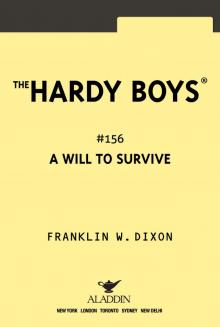 A Will to Survive
A Will to Survive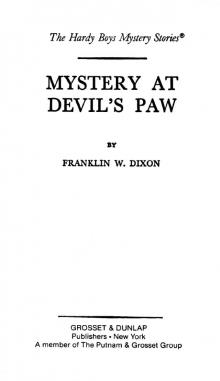 Mystery at Devil's Paw
Mystery at Devil's Paw Blood Money
Blood Money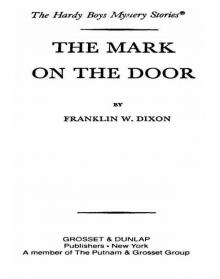 The Mark on the Door
The Mark on the Door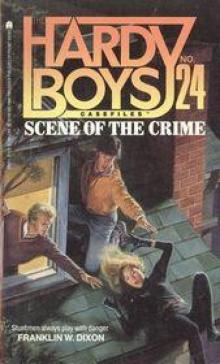 Scene of the Crime
Scene of the Crime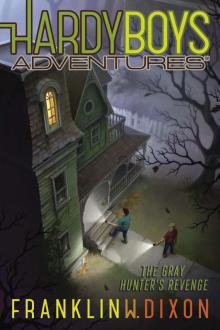 The Gray Hunter's Revenge
The Gray Hunter's Revenge Stolen Identity
Stolen Identity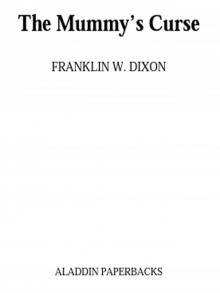 The Mummy's Curse
The Mummy's Curse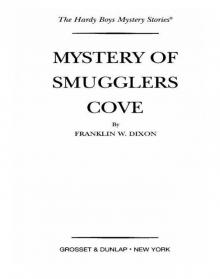 Mystery of Smugglers Cove
Mystery of Smugglers Cove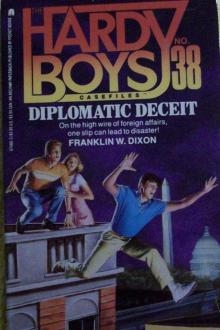 Diplomatic Deceit
Diplomatic Deceit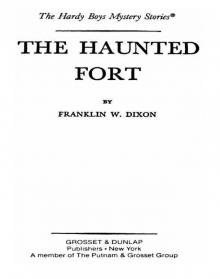 The Haunted Fort
The Haunted Fort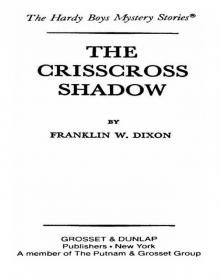 The Crisscross Shadow
The Crisscross Shadow Secret of the Red Arrow
Secret of the Red Arrow Trial and Terror
Trial and Terror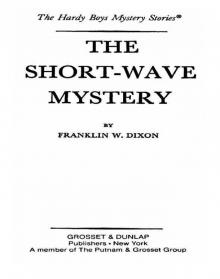 The Short-Wave Mystery
The Short-Wave Mystery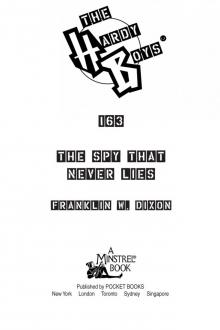 The Spy That Never Lies
The Spy That Never Lies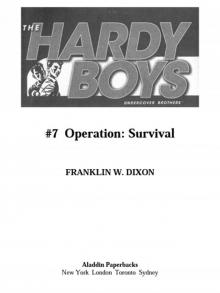 Operation: Survival
Operation: Survival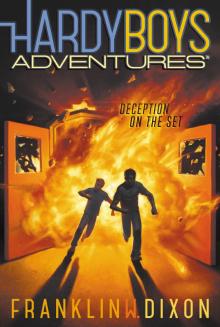 Deception on the Set
Deception on the Set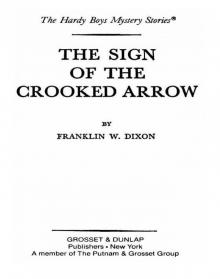 The Sign of the Crooked Arrow
The Sign of the Crooked Arrow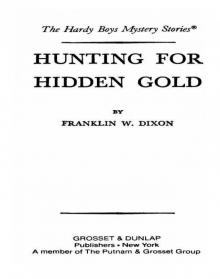 Hunting for Hidden Gold
Hunting for Hidden Gold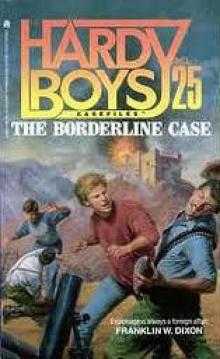 Disaster for Hire
Disaster for Hire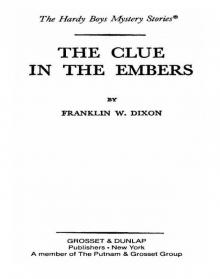 The Clue in the Embers
The Clue in the Embers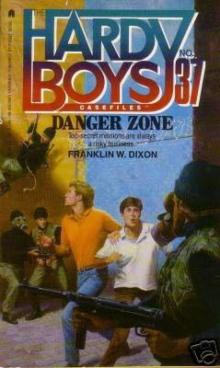 Danger Zone
Danger Zone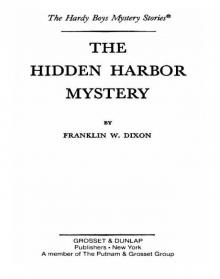 The Hidden Harbor Mystery
The Hidden Harbor Mystery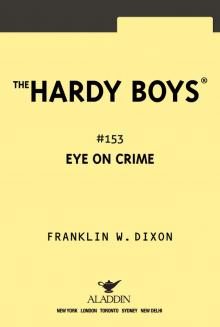 Eye on Crime
Eye on Crime A Game Called Chaos
A Game Called Chaos The Bicycle Thief
The Bicycle Thief The Missing Playbook
The Missing Playbook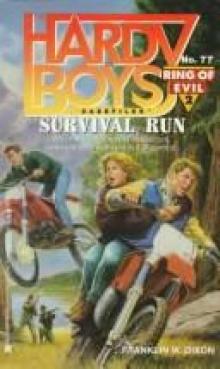 Survival Run
Survival Run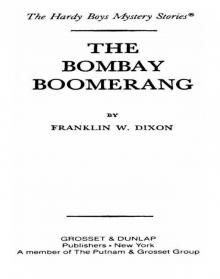 The Bombay Boomerang
The Bombay Boomerang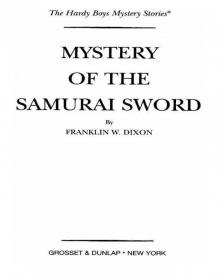 Mystery of the Samurai Sword
Mystery of the Samurai Sword Burned
Burned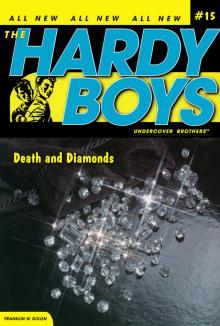 Death and Diamonds
Death and Diamonds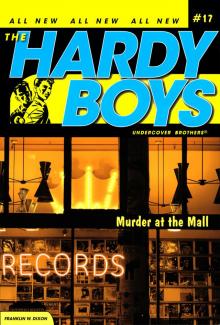 Murder at the Mall
Murder at the Mall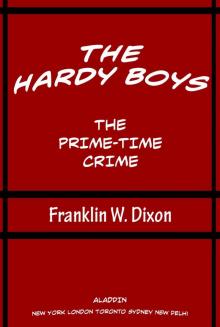 The Prime-Time Crime
The Prime-Time Crime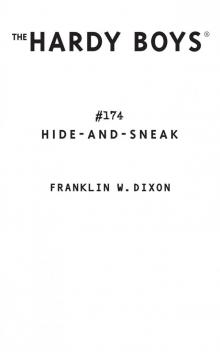 Hide-and-Sneak
Hide-and-Sneak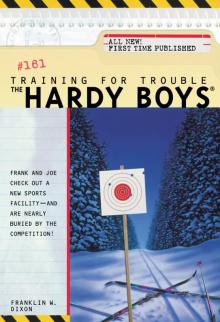 Training for Trouble
Training for Trouble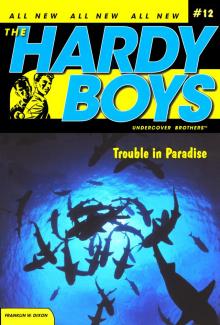 Trouble in Paradise
Trouble in Paradise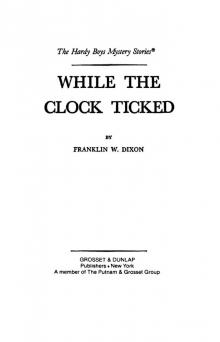 While the Clock Ticked
While the Clock Ticked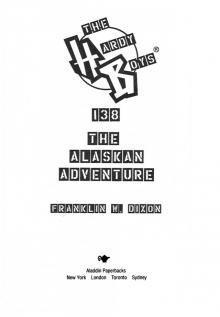 The Alaskan Adventure
The Alaskan Adventure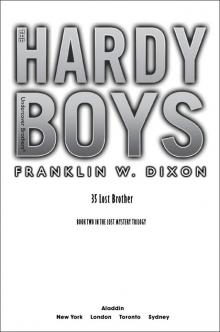 The Lost Brother
The Lost Brother Tunnel of Secrets
Tunnel of Secrets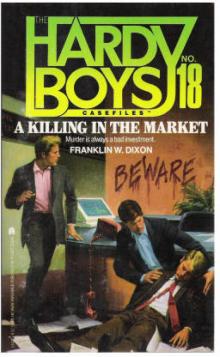 A Killing in the Market
A Killing in the Market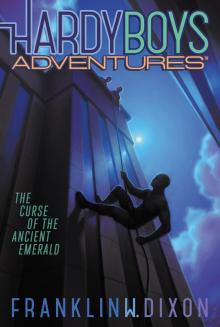 The Curse of the Ancient Emerald
The Curse of the Ancient Emerald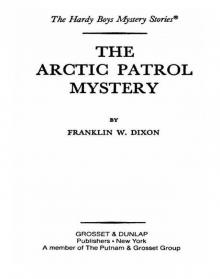 The Arctic Patrol Mystery
The Arctic Patrol Mystery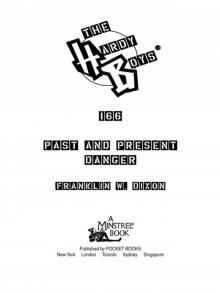 Past and Present Danger
Past and Present Danger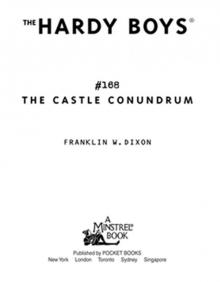 The Castle Conundrum (Hardy Boys)
The Castle Conundrum (Hardy Boys)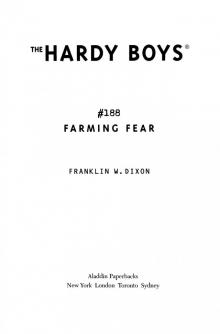 Farming Fear
Farming Fear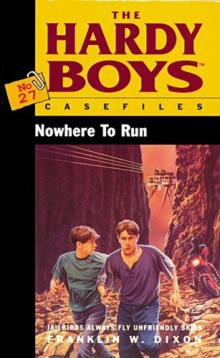 Nowhere to Run
Nowhere to Run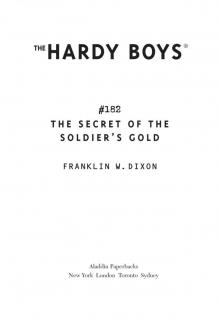 The Secret of the Soldier's Gold
The Secret of the Soldier's Gold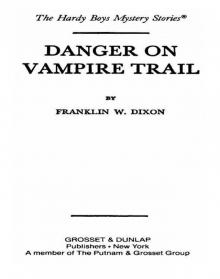 Danger on Vampire Trail
Danger on Vampire Trail The Lure of the Italian Treasure
The Lure of the Italian Treasure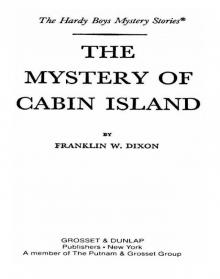 The Mystery of Cabin Island
The Mystery of Cabin Island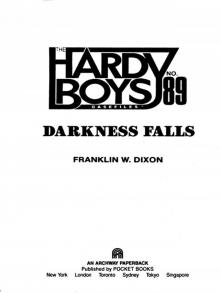 Darkness Falls
Darkness Falls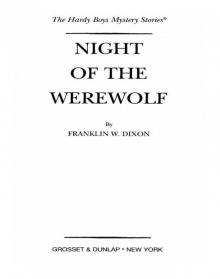 Night of the Werewolf
Night of the Werewolf Danger in the Extreme
Danger in the Extreme The Lazarus Plot
The Lazarus Plot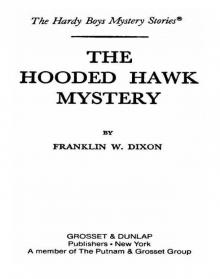 The Hooded Hawk Mystery
The Hooded Hawk Mystery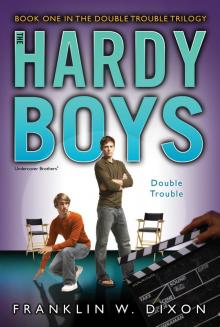 Double Trouble
Double Trouble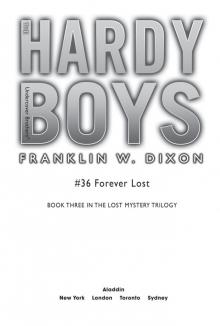 Forever Lost
Forever Lost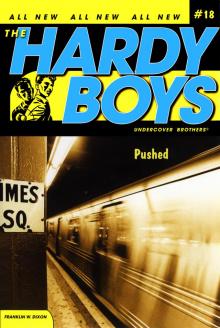 Pushed
Pushed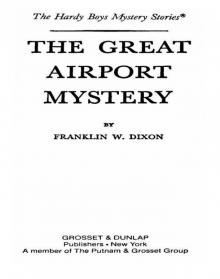 The Great Airport Mystery
The Great Airport Mystery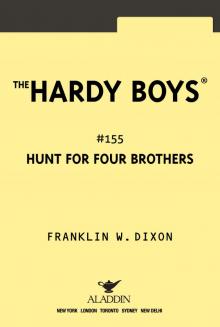 The Hunt for Four Brothers
The Hunt for Four Brothers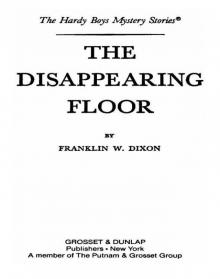 The Disappearing Floor
The Disappearing Floor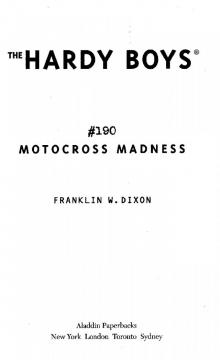 Motocross Madness
Motocross Madness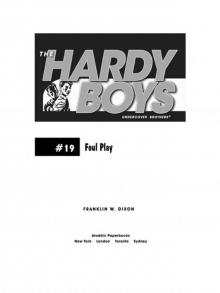 Foul Play
Foul Play High-Speed Showdown
High-Speed Showdown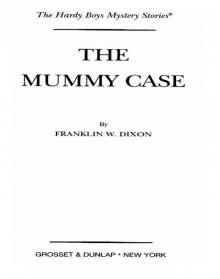 The Mummy Case
The Mummy Case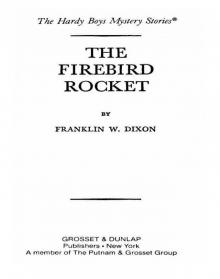 The Firebird Rocket
The Firebird Rocket Trouble in Warp Space
Trouble in Warp Space Ship of Secrets
Ship of Secrets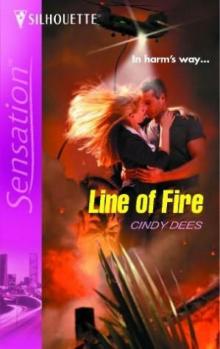 Line of Fire
Line of Fire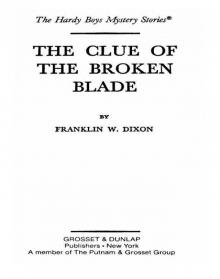 The Clue of the Broken Blade
The Clue of the Broken Blade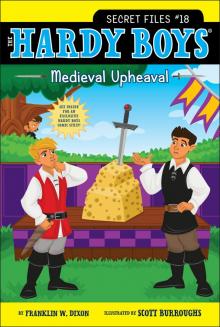 Medieval Upheaval
Medieval Upheaval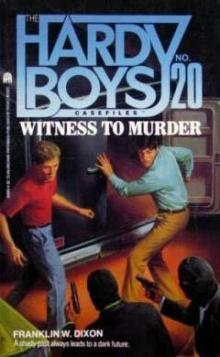 Witness to Murder
Witness to Murder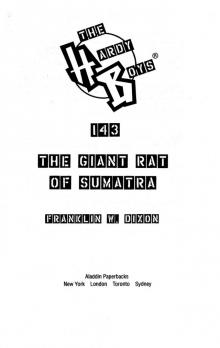 The Giant Rat of Sumatra
The Giant Rat of Sumatra Attack of the Bayport Beast
Attack of the Bayport Beast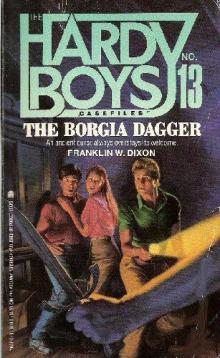 The Borgia Dagger
The Borgia Dagger Scavenger Hunt Heist
Scavenger Hunt Heist No Way Out
No Way Out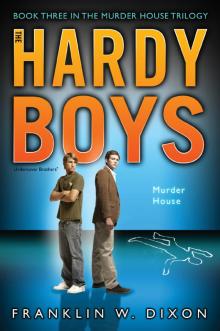 Murder House
Murder House The X-Factor
The X-Factor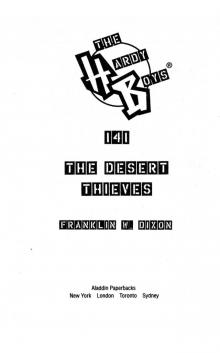 The Desert Thieves
The Desert Thieves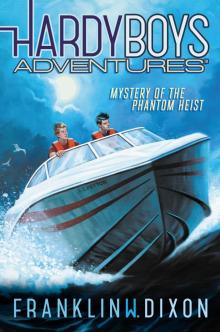 Mystery of the Phantom Heist
Mystery of the Phantom Heist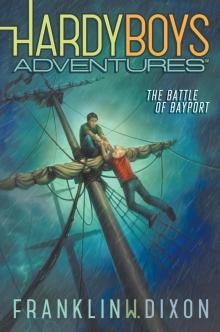 The Battle of Bayport
The Battle of Bayport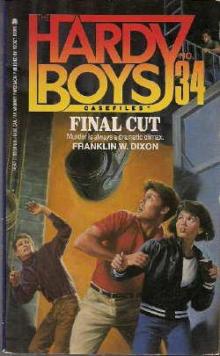 Final Cut
Final Cut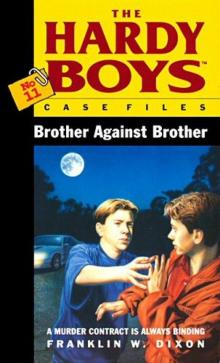 Brother Against Brother
Brother Against Brother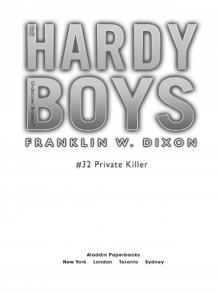 Private Killer
Private Killer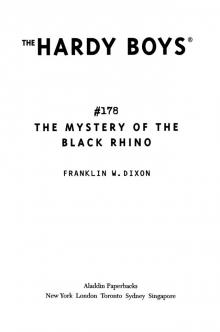 The Mystery of the Black Rhino
The Mystery of the Black Rhino Feeding Frenzy
Feeding Frenzy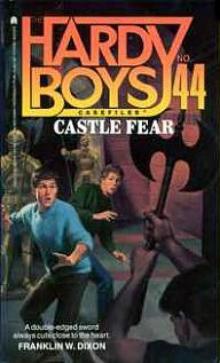 Castle Fear
Castle Fear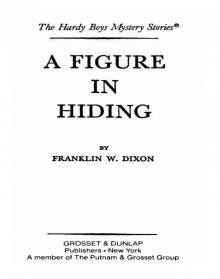 A Figure in Hiding
A Figure in Hiding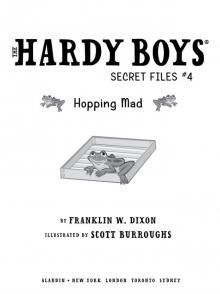 Hopping Mad
Hopping Mad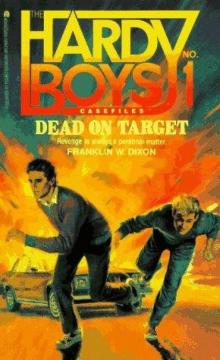 Dead on Target
Dead on Target Skin and Bones
Skin and Bones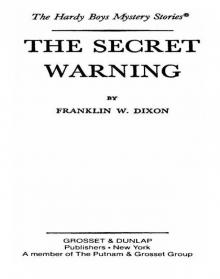 The Secret Warning
The Secret Warning Flesh and Blood
Flesh and Blood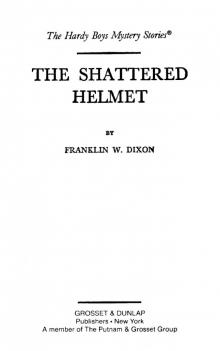 The Shattered Helmet
The Shattered Helmet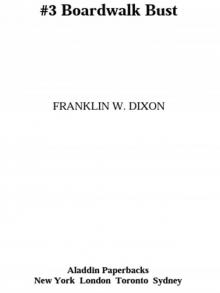 Boardwalk Bust
Boardwalk Bust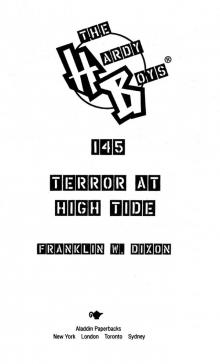 Terror at High Tide
Terror at High Tide In Plane Sight
In Plane Sight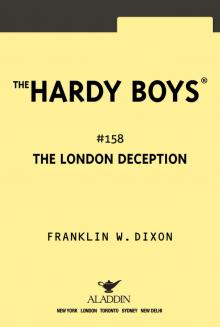 The London Deception
The London Deception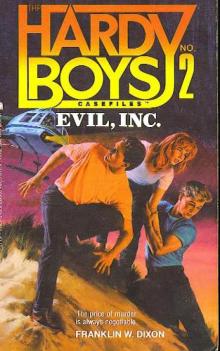 Evil, Inc.
Evil, Inc.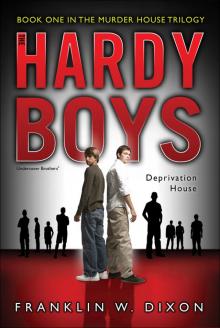 Deprivation House
Deprivation House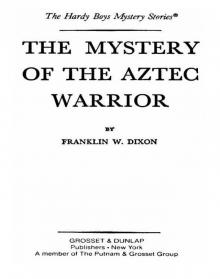 The Mystery of the Aztec Warrior
The Mystery of the Aztec Warrior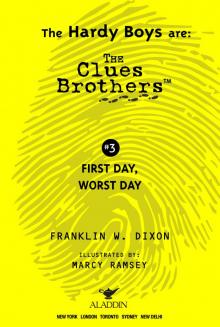 First Day, Worst Day
First Day, Worst Day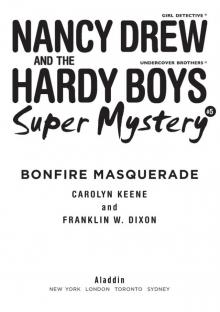 Bonfire Masquerade
Bonfire Masquerade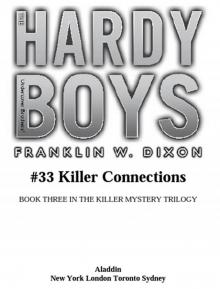 Killer Connections
Killer Connections Strategic Moves
Strategic Moves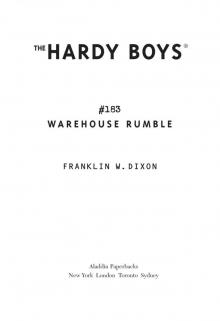 Warehouse Rumble
Warehouse Rumble The Chase for the Mystery Twister
The Chase for the Mystery Twister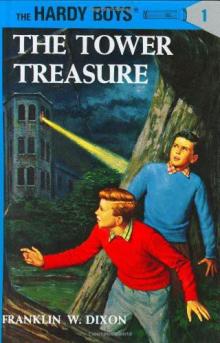 The Tower Treasure thb-1
The Tower Treasure thb-1 The Children of the Lost
The Children of the Lost The Last Laugh
The Last Laugh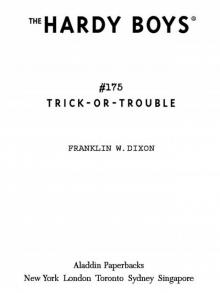 Trick-or-Trouble
Trick-or-Trouble Perfect Getaway
Perfect Getaway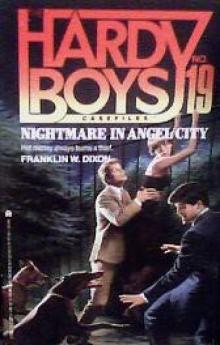 Nightmare in Angel City
Nightmare in Angel City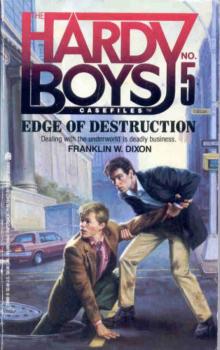 Edge of Destruction
Edge of Destruction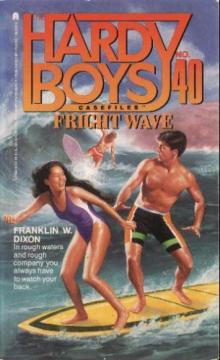 Fright Wave
Fright Wave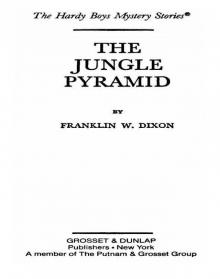 The Jungle Pyramid
The Jungle Pyramid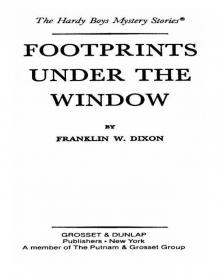 Footprints Under the Window
Footprints Under the Window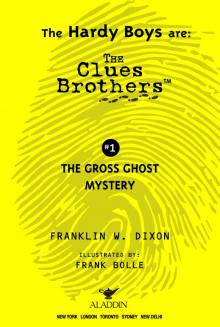 The Gross Ghost Mystery
The Gross Ghost Mystery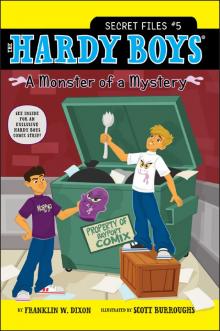 A Monster of a Mystery
A Monster of a Mystery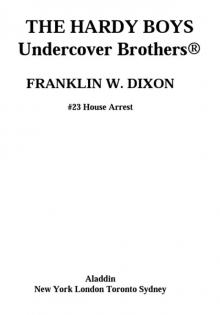 House Arrest
House Arrest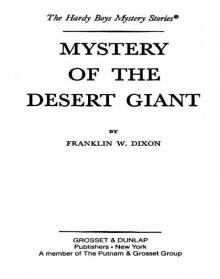 Mystery of the Desert Giant
Mystery of the Desert Giant Talent Show Tricks
Talent Show Tricks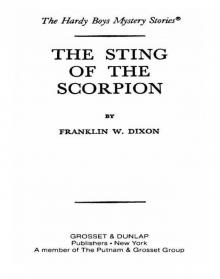 The Sting of the Scorpion
The Sting of the Scorpion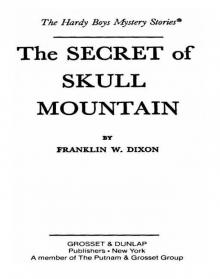 The Secret of Skull Mountain
The Secret of Skull Mountain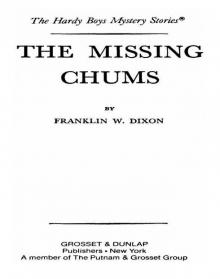 The Missing Chums
The Missing Chums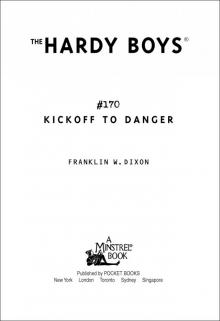 Kickoff to Danger
Kickoff to Danger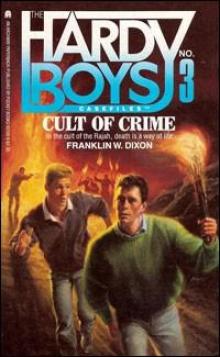 Cult of Crime
Cult of Crime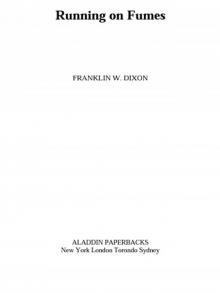 Running on Fumes
Running on Fumes Martial Law
Martial Law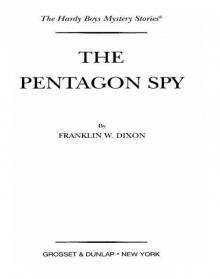 The Pentagon Spy
The Pentagon Spy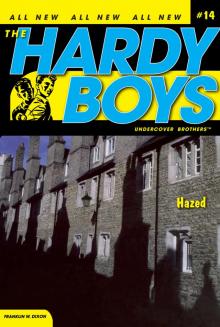 Hazed
Hazed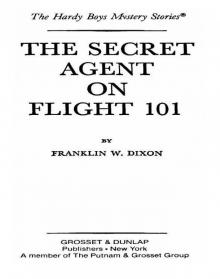 The Secret Agent on Flight 101
The Secret Agent on Flight 101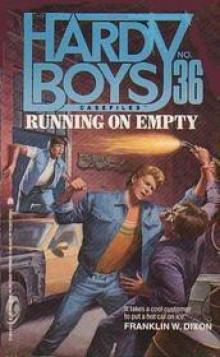 Running on Empty
Running on Empty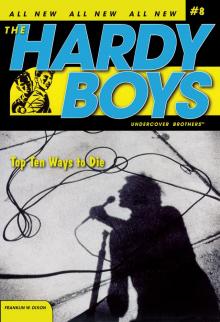 Top Ten Ways to Die
Top Ten Ways to Die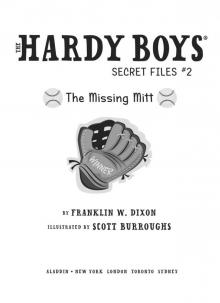 The Missing Mitt
The Missing Mitt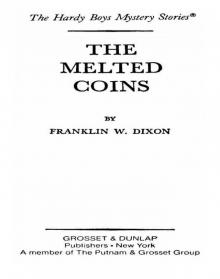 The Melted Coins
The Melted Coins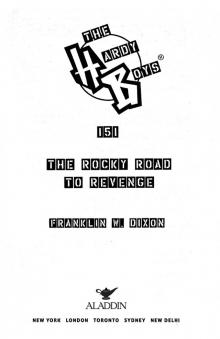 The Rocky Road to Revenge
The Rocky Road to Revenge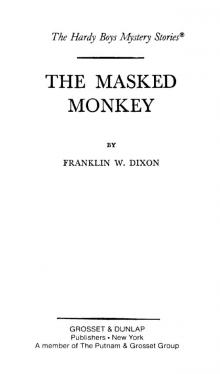 The Masked Monkey
The Masked Monkey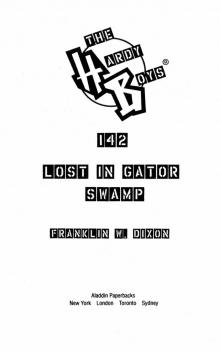 Lost in Gator Swamp
Lost in Gator Swamp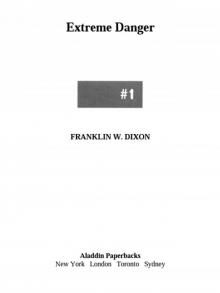 Extreme Danger
Extreme Danger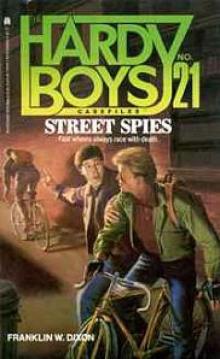 Street Spies
Street Spies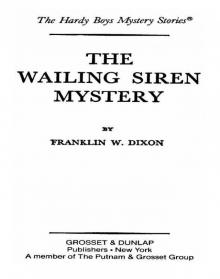 The Wailing Siren Mystery
The Wailing Siren Mystery The Dangerous Transmission
The Dangerous Transmission Hurricane Joe
Hurricane Joe The Crisscross Crime
The Crisscross Crime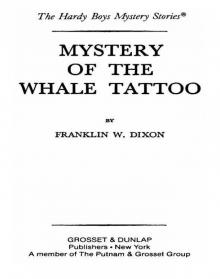 Mystery of the Whale Tattoo
Mystery of the Whale Tattoo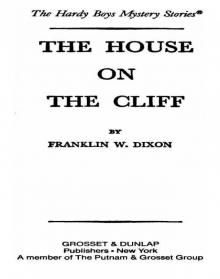 The House on the Cliff
The House on the Cliff Camping Chaos
Camping Chaos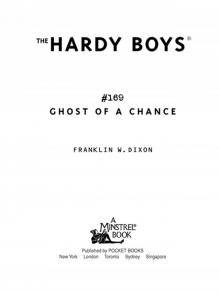 Ghost of a Chance
Ghost of a Chance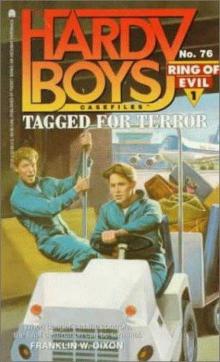 Tagged for Terror
Tagged for Terror Thrill Ride
Thrill Ride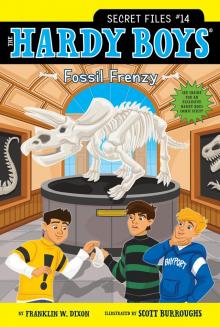 Fossil Frenzy
Fossil Frenzy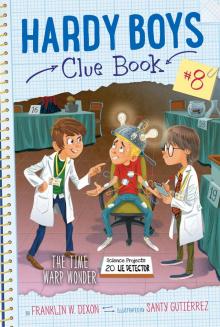 The Time Warp Wonder
The Time Warp Wonder Ghost Stories
Ghost Stories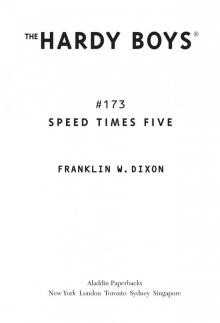 Speed Times Five
Speed Times Five What Happened at Midnight
What Happened at Midnight Three-Ring Terror
Three-Ring Terror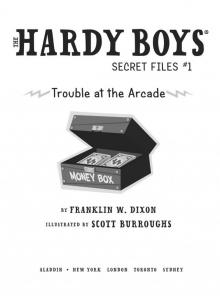 Trouble at the Arcade
Trouble at the Arcade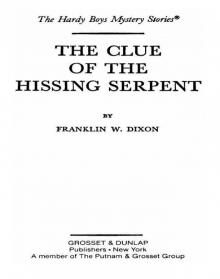 The Clue of the Hissing Serpent
The Clue of the Hissing Serpent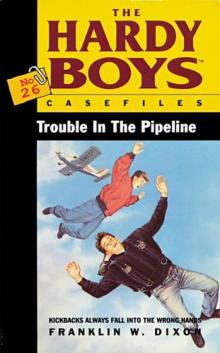 Trouble in the Pipeline
Trouble in the Pipeline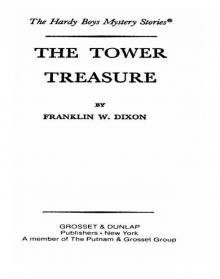 The Tower Treasure
The Tower Treasure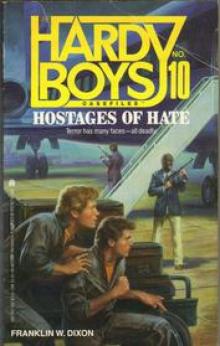 Hostages of Hate
Hostages of Hate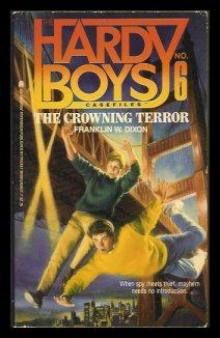 The Crowning Terror
The Crowning Terror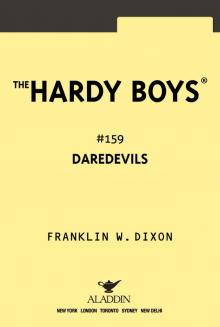 Daredevils
Daredevils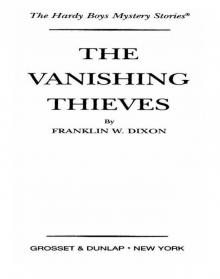 The Vanishing Thieves
The Vanishing Thieves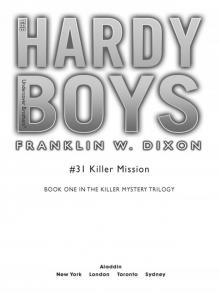 Killer Mission
Killer Mission The Mark of the Blue Tattoo
The Mark of the Blue Tattoo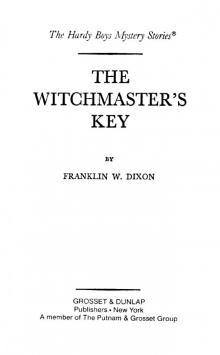 The Witchmaster's Key
The Witchmaster's Key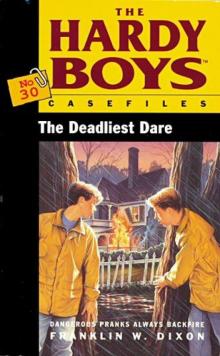 The Deadliest Dare
The Deadliest Dare Peril at Granite Peak
Peril at Granite Peak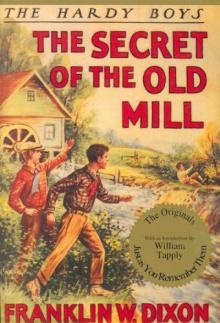 The Secret Of The Old Mill thb-3
The Secret Of The Old Mill thb-3 Rocky Road
Rocky Road The Demolition Mission
The Demolition Mission Blown Away
Blown Away Passport to Danger
Passport to Danger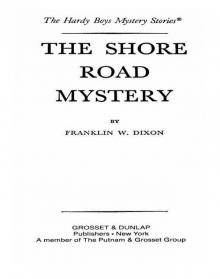 The Shore Road Mystery
The Shore Road Mystery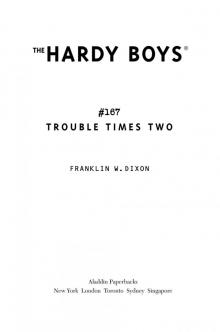 Trouble Times Two
Trouble Times Two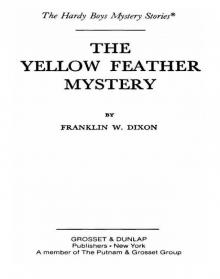 The Yellow Feather Mystery
The Yellow Feather Mystery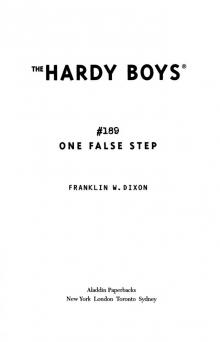 One False Step
One False Step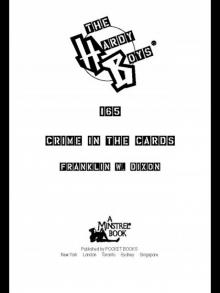 Crime in the Cards
Crime in the Cards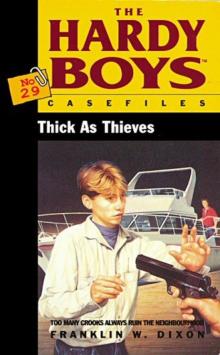 Thick as Thieves
Thick as Thieves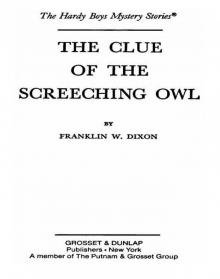 The Clue of the Screeching Owl
The Clue of the Screeching Owl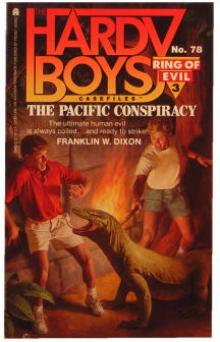 The Pacific Conspiracy
The Pacific Conspiracy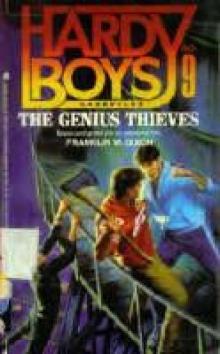 The Genius Thieves
The Genius Thieves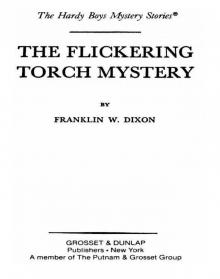 The Flickering Torch Mystery
The Flickering Torch Mystery Into Thin Air
Into Thin Air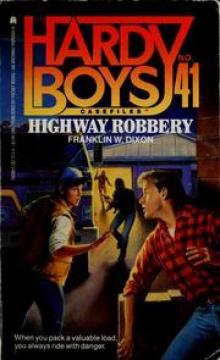 Highway Robbery
Highway Robbery Deadfall
Deadfall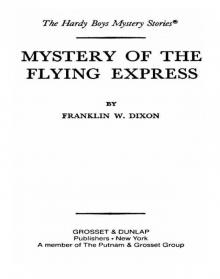 Mystery of the Flying Express
Mystery of the Flying Express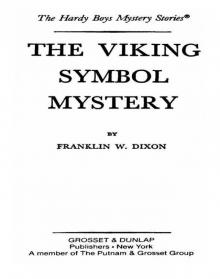 The Viking Symbol Mystery
The Viking Symbol Mystery The End of the Trail
The End of the Trail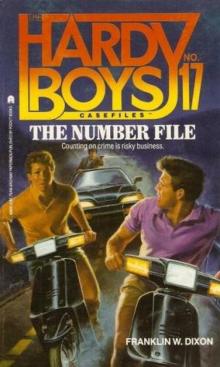 The Number File
The Number File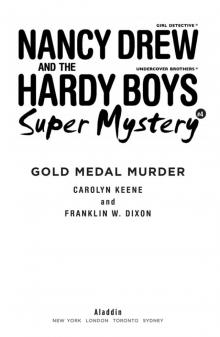 Gold Medal Murder
Gold Medal Murder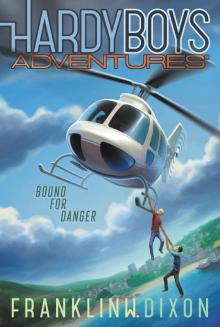 Bound for Danger
Bound for Danger Collision Course
Collision Course The Madman of Black Bear Mountain
The Madman of Black Bear Mountain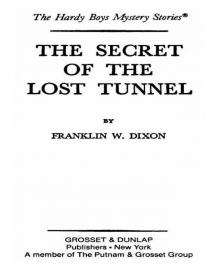 The Secret of the Lost Tunnel
The Secret of the Lost Tunnel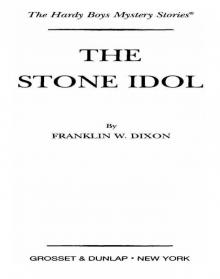 The Stone Idol
The Stone Idol The Secret of Pirates' Hill
The Secret of Pirates' Hill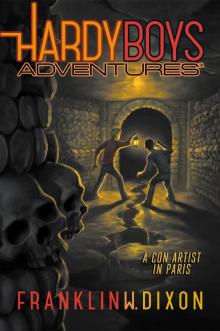 A Con Artist in Paris
A Con Artist in Paris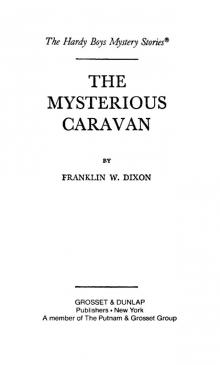 The Mysterious Caravan
The Mysterious Caravan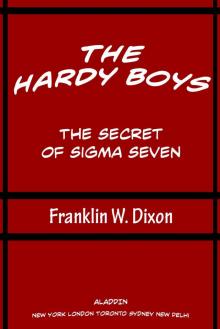 The Secret of Sigma Seven
The Secret of Sigma Seven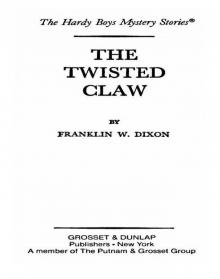 The Twisted Claw
The Twisted Claw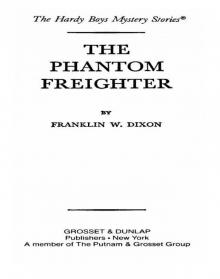 The Phantom Freighter
The Phantom Freighter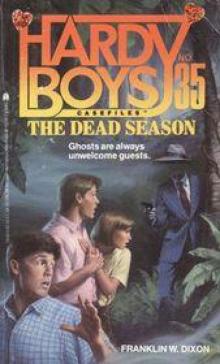 The Dead Season
The Dead Season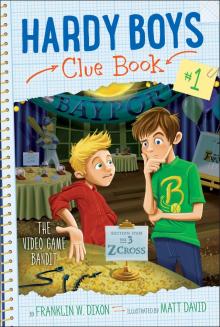 The Video Game Bandit
The Video Game Bandit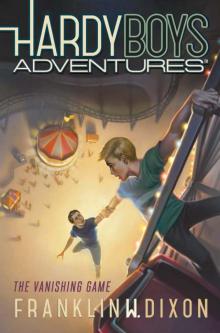 The Vanishing Game
The Vanishing Game Typhoon Island
Typhoon Island